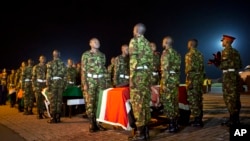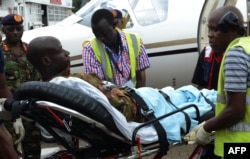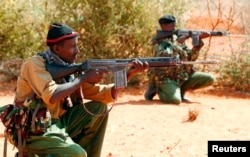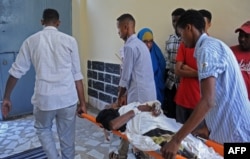Somalia's president says between 180 and 200 Kenyan soldiers were killed when Islamist militants attacked an African Union base in southwestern Somalia last month.
President Hassan Sheikh Mohamud discussed the figures during an interview with a Somali TV channel late Wednesday, when asked why he attended a memorial ceremony for the soldiers in Kenya.
"When about 180 to 200 boys sent to Somalia to restore peace are killed in one morning, it's not something easy," he said.
Claim denied
Kenya Defense Forces spokesman, David Obonyo, quickly denied Mohamud's claim. Speaking to a Kenyan newspaper, The Star, he said, "The Somali president must be in cahoots with al-Shabab. The number he is quoting is way beyond a company size."
Kenya has never said how many soldiers died when al-Shabab militants attacked the base in the town of El Adde, but acknowledged having a "company size" force at the site.
Al-Shabab said it killed more than 100 Kenyan troops.
Kenyan soldiers have been in Somalia since 2011, helping the African Union mission, known as AMISOM, fight al-Shabab.
Force has upper hand
The head of AMISOM, Franciso Caetano Madeira, said the AU troops still had the upper hand over the militants despite some recent setbacks.
In an exclusive interview Wednesday with VOA Somali Service, Madeira said, “AMISOM is effectively gaining ground, and putting al-Shabab on the move, and al-Shabab is forced to renew, to reconfigure, to reconstruct itself to survive. The government of Somalia is in control of 80 percent of south-central Somalia, and this shows that al-Shabab has been moved from those places.
Regional experts and some Somali officials have expressed concern about AMISOM's withdrawal from a number of towns after al-Shabab raids on three forward bases, including El Adde.
Madeira strongly denied AMISOM is withdrawing from the towns, insisting that troop movements are just “readjustments and repositioning to attain a tactical advantage."
“AMISOM forces are to pursue the enemy wherever they are. Our new strategy in line with the revised ConOps [Concept of Operations] is for operations to be enemy threat-focused and not terrain-focused."
Asked when AMISOM may leave Somalia, Madeira said it will happen when the mission's objectives are accomplished.
“AMISOM will leave Somalia when Somalis ask it to leave," he said. "Second, AMSIOM will leave Somalia when its mandate is accomplished, and its mandate is to create situations... that can allow for the government of Somalia and the institutions of Somalia to function properly, and governance to take place all throughout the country."
Mogadishu Attack
Meanwhile, at least four people were killed Thursday when al-Shabab fired mortars at the presidential palace in Mogadishu but hit a private home.
A reporter for VOA's Somali service said a woman and her two children were killed. The father, who was seriously wounded in the attack, was rushed to the hospital and later pronounced dead.
At least five other people were wounded.
A pro-al-Shabab website said the mortar hit inside the presidential palace, Villa Somalia. There has been no comment from the government.
Al-Shabab has been fighting the Somali government since 2006 to establish a strict Islamist state.
(Harun Maruf of VOA's Somali Service contributed to this report.)







